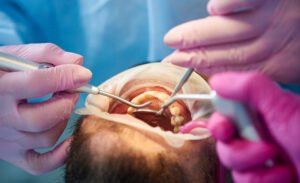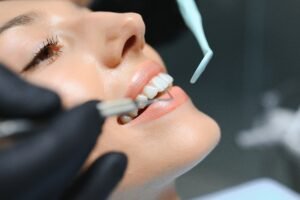Your teeth can become damaged by tooth decay, which has the potential to cause cavities, dental abscesses, or even tooth loss. It is brought on by specific bacterial species that can reside in tooth plaque.
Defining tooth decay
Damage to your tooth’s enamel surface is known as tooth decay. It occurs when oral bacteria produce acids that destroy the enamel—cavities which are holes in your teeth that can result from tooth decay. Dental decay can result in discomfort, infection, and even tooth loss without treatment.
Read More: The Benefits of Orthodontic Treatment in Calgary: Beyond Straight Teeth
Tooth decay reasons
There are plenty of tooth decay reasons you will find on the internet. We have lots of microorganisms in our mouths. Some microorganisms are advantageous. However, some of them, like the ones that contribute to dental decay, can be hazardous. Plaque is a sticky, squishy layer made of these microorganisms and food. The bacteria use the starch and sugar in your food and drink in plaque to produce acids.
The minerals on your enamel start to deteriorate due to the acids. The plaque may eventually become tartar. Plaque and tartar can irritate your gums, lead to gum disease, and harm your teeth.
Along with your saliva, this fluoride aids the enamel’s self-healing process by replacing the minerals. Your teeth go through the normal process of give-and-take of minerals.
Must See: A Parent’s Guide to Children’s Dental Care: Establishing Healthy Habits Early
However, your enamel will lose minerals if you don’t care for your teeth and consume many sugary or starchy foods and beverages—tooth decay results from this.
Absence of such minerals can cause a white area on teeth. An early indicator of tooth decay is this. At this point, you can slow down or stop the degradation. If you take better care of your teeth and avoid eating too much sweet or starchy food, your enamel can still heal.
But additional minerals are lost as the tooth decay process progresses. The enamel frails and breaks down over the period of time which leads to a cavity. In your tooth, a cavity is a hole. A dentist requires a filling to fix the lasting damage.
Here is how you can avoid tooth decay
Proper diet
Having an improper diet is one of the tooth decay reasons that you should know. Black tea, coffee, fruit juices, sodas, and energy drinks contribute to tooth disease by bathing teeth in an acidic, sugary solution with each swallow. Since alcoholic beverages are typically enjoyed throughout the day, the enamel cannot re-harden after exposure to harmful acids, making erosion of the enamel layer and subsequent tooth decay unavoidable. Insufficient diet is one of the major reasons of tooth decay.
Check Now: What Is a Dental Bridge and How Does It Improve Oral Health?
Dental hygiene
Dental hygiene is one of the major reasons of tooth decay. Use fluoridated toothpaste and a soft-bristled brush to gently brush twice daily for two minutes. Set a timer to ensure you brush for at least two minutes, or get a rechargeable electric toothbrush—the majority have a built-in timer option.
Use string floss to floss once daily to reach areas between the teeth that a toothbrush can’t. Gently work the string in a C shape around the tooth using an 18-inch strand wound around the fingers with about an inch or two of working space.
Drink plenty of water
Not having enough water is one of the tooth decay reasons that you should know. To maintain hydration during the day time, you will have to intake lots of water. Gum that has been ADA-approved and is sugar-free can aid in increasing salivation. By gradually attempting to change or give up bad habits like smoking, drinking alcohol or coffee,
Read More: Understanding Different Types Of Root Canal Treatments
Find a treatment plan with your doctor and dentist to deal with symptoms brought on by prescription drugs or medical issues. A medicine or oral rinse that increases salivation may be recommended to you. Any medicine causing dry mouth may be changed at your doctor’s discretion. Your dentist will carefully monitor your oral health and how dry mouth affects it over time, providing preventative measures to safeguard your teeth from dental disease. Oral rehydration is one of the major reasons of tooth decay.
Treat medical disorders
See a doctor as soon as you can. You should let your doctor and dentist know if you have any medical conditions. They will assist you in determining the best course of action to either control or treat the side effects and their symptoms.
An oral device or nighttime biting splint may be administered to people with sleep apnea, snoring, or bruxism. Other techniques to reduce symptoms include avoiding lying on your back while you sleep, beginning a regular exercise regimen,
Read More: Common Orthodontic Problems, and How to Treat Them?
Dental check-ups
Concentrate on eradicating the leading contributors to dental decay from your life. Visit the dentist for an examination and prophylactic cleaning at least once yearly. You should prioritise dental check-ups once in a while. At times, not going for dental check-ups can be one of the major reasons of tooth decay.
Treatments for tooth decay
Dentists can typically detect tooth decay and cavities by inspecting your teeth and using dental tools to probe them. If you have any symptoms, your dentist will inquire further. You could occasionally require a dental x-ray. Based on that, your dentist will choose the right treatment for you.
Fluoride treatment – A fluoride treatment may help the enamel heal if you have early tooth decay.
Root canal treatment – You could require a root canal if the tooth has been harmed or an infection has reached the pulp (inside the tooth). Your dentist will clean the inside of the tooth and root while removing the decaying pulp. Now it is time to place a temporary filling in the tooth. You will then need to return to acquire a crown or a permanent filling.
Fillings – Your dentist will first remove the rotted tooth tissue if you have a normal cavity, and then they will rebuild the tooth by filling it with a filling substance.
Tooth extraction – Your dentist might recommend pulling the tooth in difficult situations with irreparable pulp damage. Your dentist will advise getting an implant or bridge to replace the missing tooth. Otherwise, your bite may vary as the teeth next to the gap shift. Here is a comprehensive guide of do’s and don’ts to follow after tooth extraction.
Conclusion
Anyone going through dental pain or discomfort should visit their dentist. To stop decay, a person should also go to the dentist on a regular basis for checkups.















